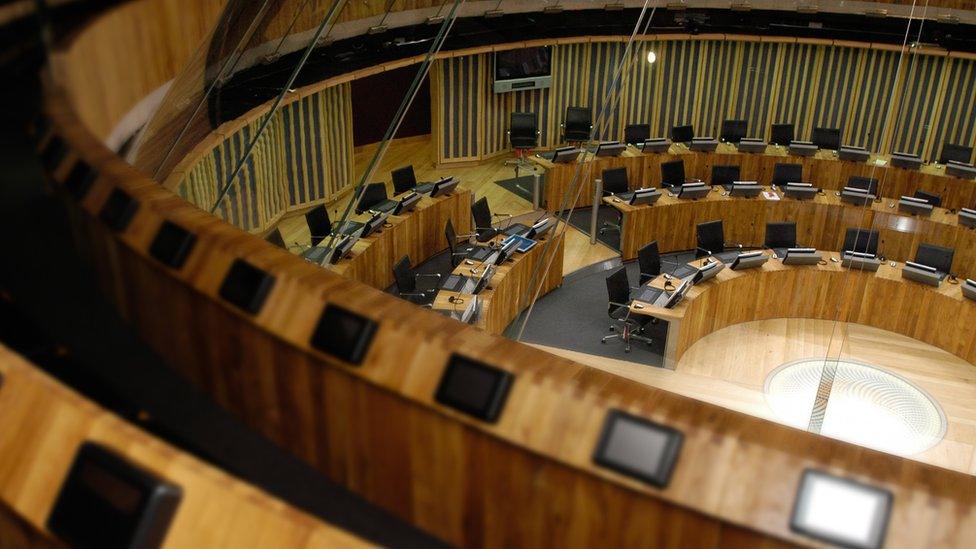Westminster to keep Welsh police and justice powers under Labour plans
- Published

A new report on how Britain could look under a Labour UK government has stopped short of backing First Minister Mark Drakeford's calls for Wales' justice system to be run from Cardiff.
The report by a commission led by ex-Prime Minister Gordon Brown recommended abolishing the House of Lords.
But it failed to support the devolution of policing, prisons and adult courts.
Launching the report, leader Sir Keir Starmer promised the "biggest ever transfer of power from Westminster".
Mr Drakeford's Labour Welsh government has supported the devolution of justice powers for years.
Instead, the commission on the future of the UK recommended youth justice and probation be handed to ministers in Cardiff.
It says "new powers should be made available to the Senedd and Welsh government" but makes few specific recommendations.
Plaid Cymru called the findings a "damp squib", while Welsh Conservatives said there was no public appetite for further devolution.
Other recommendations say Welsh devolution should be constitutionally protected, in part through the replacement for the House of Lords, which would be called the Assembly of Nations and Regions.
Devolution is the process through which Welsh institutions have gained powers over areas like the health service and education since the creation of the assembly in 1999.
Mr Brown's report said there was no "constitutional reason why matters which are devolved in Scotland... could not also be devolved in Wales".
'Practical challenges'
But the report suggested that the ability of Welsh institutions to handle new powers in Wales could be a reason not to go further.
It said devolution should be "constrained only by reserving those matters which are necessary to discharge the purposes of the UK as a union, and in practice by the wishes of the Senedd itself... and of course by the practical challenges of transferring new powers and building the capability to operate them".
The Welsh government has claimed it could cut the number of people in prison if it controlled the country's justice system.
"Many in Wales seek the devolution of such powers," the report said.
"We understand this aspiration, and believe the next UK Labour government should embark upon the devolution of youth justice and the probation service."
Justice powers are devolved in Scotland and Northern Ireland.
Meanwhile the report says the Sewel convention - the voluntary system by which Westminster seeks the approval of the Senedd for laws that cover devolved issues - would be made "legally binding".
It also said Members of the Senedd (MSs) should enjoy the same privileges and protections, if they want them, as Members of Parliament (MPs) over the statements they make in their proceedings.
The report also suggested allowing the Scottish government to enter into international agreements involving Scottish areas, and giving councils fiscal powers to raise revenue.
'Backtracks from Labour promises'
Plaid Cymru Westminster leader Liz Saville Roberts said the report "backtracks from previous Labour promises - the 2017 Labour manifesto having promised the devolution of policing to Wales".
"This report is a damp squib for Wales," she said, adding: "The Labour Welsh government's Thomas Commission recommended that justice should be wholly devolved, and a Welsh legal jurisdiction created.
"This timid report only offers piecemeal powers over youth justice and probation, showing the level of disdain the central Labour party holds towards the only government it currently runs."
Welsh Conservative shadow minister for the constitution Darren Millar said: "There is no great public appetite in Wales for further powers to be devolved to the Senedd.
"Wales already has the powers it needs to deliver a better economy, better schools and better hospitals, but sadly the Labour Party has spectacularly failed to use them to achieve those aims.
"Instead of its obsession with constitutional tinkering, the Labour Party should be using the existing powers it has to improve the lives of the people of Wales."
Former First Minister Carwyn Jones and former Welsh Secretary Paul Murphy were among those on the commission.
Mr Drakeford said: "Labour is the party of devolution and this report shows that only Labour is thinking urgently about the future of the United Kingdom.
"This report puts forward important ideas about how power can be devolved and shared throughout the country to create a stronger union," he added.
Welsh law expert Prof Emyr Lewis from Aberystwyth University said the proposals had an "obvious omission here when it comes to the question of finance".
"There's no reference in the report to ensure fair and binding rules on distributing money across the UK," he told BBC Radio Cymru.


Mark Drakeford may have welcomed this report, but its recommendations for Wales are a far cry from his published thinking about the future of Wales within the UK.
He has previously supported calls for "radical federalism" based on the idea that "the UK is a voluntary association of four nations".
His government wants to take over the running of the justice system in Wales. The Brown report says it "understands the aspiration", but instead it recommends handing the Welsh government power over probation and youth justice only.
Welsh Labour sources stress that this report is more about the UK as a whole than Wales in particular, but it does illustrate the differences that exist within Labour on the speed and extent of further constitutional change.
The Welsh government has established a separate commission to look at Wales' constitutional future, which publishes its interim report on Wednesday. I'm also told Gordon Brown was wary of intruding into its remit.
Related topics
- Published9 November 2022

- Published19 October 2021

- Published1 December 2022
